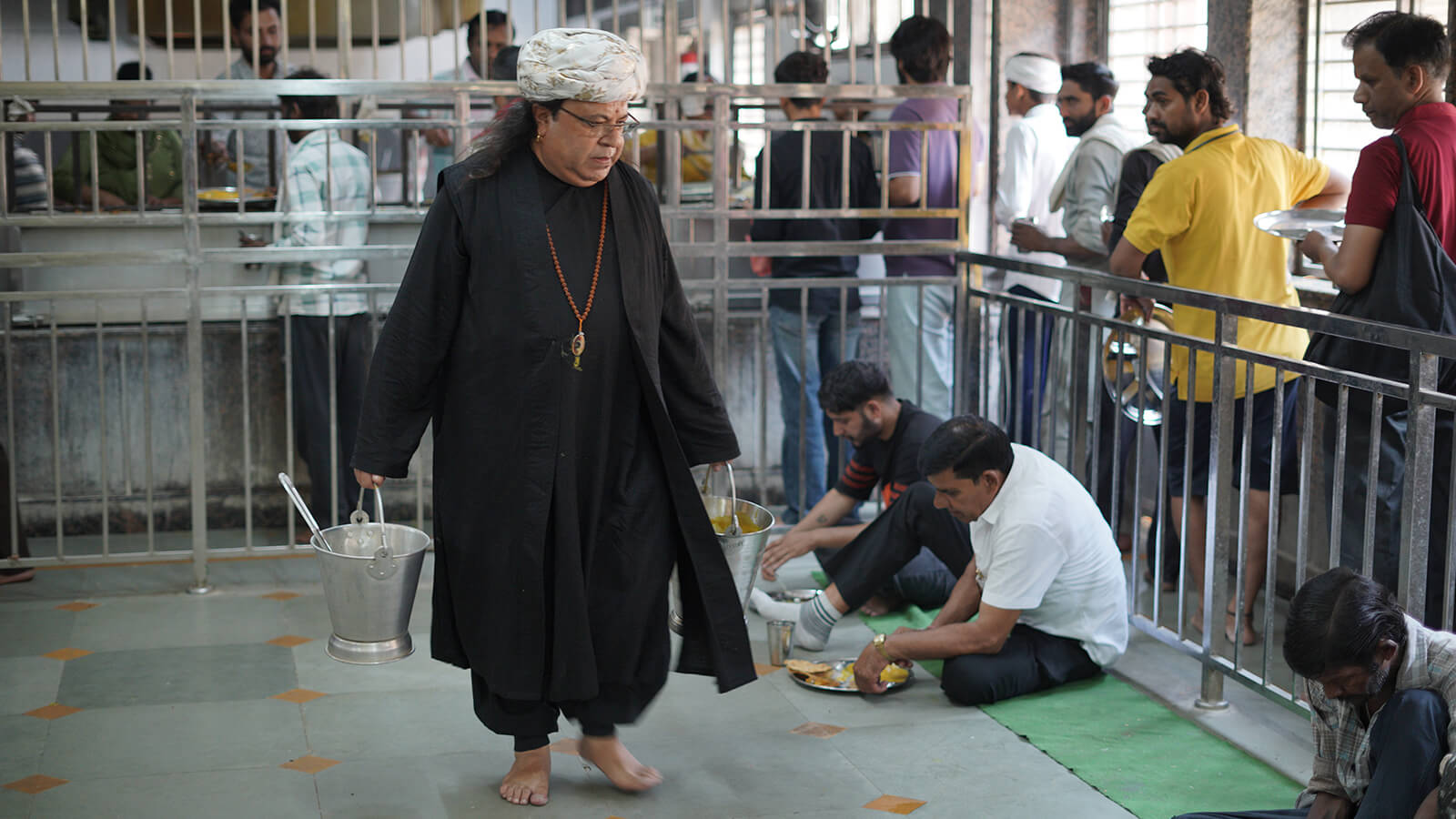In the Name of Dharma, Are We Feeding Devotion—Or Decay?
(Based on the live discourse of Param Dwij)
(परम द्विज के प्रवचन पर आधारित)

The temple of Mata Bala Sundari at Trilokpur stands like a dream drawn from the heavens—nestled amidst the Shivalik foothills, where the air is thick with incense and the sound of temple bells echoes through the valley like a call to the soul. Devotees climb the stone steps with eyes closed and hands joined, whispering their hopes, their wounds, and their gratitude. The banners flutter in the wind, marigold garlands swing from every corner, and the sacred chauki of the goddess is bathed in divine light. There is devotion here—raw, pure, and powerful.
And it was here, in this sacred land, that we held a bhandara – a public feast.
We prepared not just food but prasad—an offering of love, humility, and sacred service. My team worked hard—from chopping vegetables at dawn to cleaning the last thali until late afternoon. The entire space, from the temple courtyard to the open hall, was spotless, filled with warmth and the spirit of seva. Every person, regardless of caste, class, or creed, was welcomed and fed. That is what dharma demands. That is what we live by.
But just as light attracts moths, so too does compassion attract those who mistake generosity for weakness.
Toward the end of the day, I noticed a pattern—a group of women with young children, not more than 8 to 10 years old, began arriving with plastic bags, tiffin boxes, even small buckets like containers. Not for one meal. Not for two. But for several meals. Every woman filled ten or more containers each. Children came back repeatedly, hiding bags under their shawls. On average, each person had packed over 10 kilos of food. This was not hunger. This was hoarding. This was theft dressed as poverty.
And I had to act. I instructed my team: No more food to be taken outside. Because this was no longer seva. This was social abuse.
I talked to the temple team there and expressed my concern. They told me that this is a daily routine that these women with children come and collect all 3 meals served during the day. I was surprised that what do they do with 30-40 kilos of cooked food every day. Their family members cannot eat that much. Either they must be selling the cooked food or destroying the unconsumed food. What a wastage of food in the name of religion and service. And, that is not just one ‘Bhandara’ service. There are thousands of such daily ‘Bhandaras’ across the country. This is on top of the fact that Government of India is distributing free food to all poor people of the country who are below certain income level.
Let me speak plainly, from the depths of truth:
This—what we witnessed—is a social evil. A growing disease. And it must be named.
Beggary in the name of religion is not dharma—it is decay.
Just like ‘sati pratha’ was once falsely glorified as sacred, this ritualised dependence on charity is becoming a normalised vice. We are allowing temples to become food banks for the lazy. Children who should be in school are learning that life rewards the manipulative. And when the free food runs out—what remains? A mind conditioned for entitlement. A spirit that can be easily corrupted. A path that leads, inevitably, to crime… and even terrorism.
Yes, terrorism.
Because when you raise a generation on the idea that food and survival come without effort, without integrity, without karma—you also raise a generation that will reach for anything when that illusion crumbles. Including violence.
And let us not pretend it was the destitute. All of them were able-bodied, clever, and fully aware of what they were doing. This isn’t poverty. It is opportunism. It is a subtle exploitation of faith and service by those who have learned that temples are soft targets for their greed.
So I ask—where is this country heading?
Where are we taking our children when we feed not just their bellies, but their dependence?
Where is our dharma when it begins nurturing decay in the name of compassion?
When I came home in the late evening, I was still disturbed. I called the manager in-charge of the temple and expressed my feelings. He understood and asked me to write a brief message to him on this, so that he can take appropriate action. So, I wrote to him. I haven’t received any reply so far but I said,
“Vijay Pal ji,
Jai Mata Ki!
I talked to you yesterday. It was nice.
With the blessings of Mata Rani, everything went well. All the employees seemed very intelligent and hardworking. From the kitchen to the hall, there was complete cleanliness from start to finish. Many congratulations and best wishes to you and your entire team from our side.
As I mentioned yesterday, one thing that really saddened me was that at the end some poor people (women) along with their 8-10 year old kids started stuffing food into empty cans and plastic bags! The surprising thing was that they would come again and again with new empty boxes and envelopes. On an average, one person filled the envelopes 10 times. After which I asked my staff who were serving food to not give anyone take-away food.
Each person had already got at least 10 kg of food packed. But still, they felt like they were not getting satisfied.
By distributing hundreds of kilos of food in this manner, we are promoting a dangerous evil in the society which will give rise to unemployment, theft, illiteracy etc. in the country. Any person who is organizing a community kitchen is not doing it so that such people take home a lot of food.
I hope you will pay attention!
Jai Mata Ki!
Yours,
Param Dwij”
I, Param Dwij, say this not out of anger, but with unshakable conviction: It is not service to feed greed. It is not bhakti to encourage laziness. And it is not dharma to remain silent when religion itself is being hijacked by decay.
Let every bhandara be organised with a commitment to discipline, wisdom, and self-control. Our collective effort should focus on genuinely serving those who are truly hungry and helpless, rather than catering to individuals who arrive with containers of selfishness and ulterior motives. We must strive to ensure that our temples are sanctuaries of upliftment and empowerment, rather than becoming mere crutches for dependence. In doing so, let us foster an environment where spiritual nourishment and community support flourish, guiding those in need towards self-sufficiency and dignity.
Suppose we fail to take action at this critical moment. In that case, we risk transitioning from being active stewards of our beliefs and values to becoming passive contributors to a more profound societal decline. The urgency of our duty cannot be overstated; in our silence and inaction, we may inadvertently support systems and structures that lead to widespread injustice and inequality. It is essential that we rise to the occasion, not only to uphold our faith but to foster a more equitable society for everyone.
Let the bells of Trilokpur resonate not only with the avid devotion of its people but also with a profound awakening of the spirit. May the sacred land of the Goddess transform into a vibrant realm where truth flourishes, illuminating the hearts and minds of all who dwell here. Let this divine place not only serve as a sanctuary for worship but also as a beacon of honesty and enlightenment, guiding its inhabitants toward a deeper understanding of themselves and the world around them.



